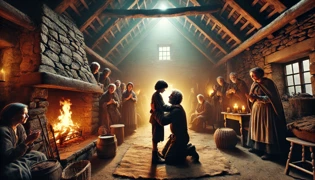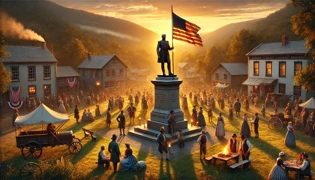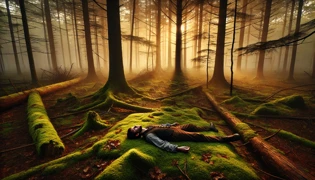Introduction
Rip Van Winkle stood at the edge of the forest, sunlight dappled through the ancient oaks. The air trembled with the song of unseen birds, and a gentle wind carried the scent of pine and earth. He closed his heavy eyelids, letting the hush of the woods soothe his tired mind. For years, the ceaseless bustle of town—his wife’s impatient voice, the children’s demands, the neighbors’ gossip—had pounded at his sensibilities. Here, in the Company of silent giants and murmuring streams, he believed he could find solace. Little did he suspect that the forest held more than peace. Beyond the mossy stones and hidden clearings lay a secret that would carry him across twenty years in a single, dreamlike night. Rip’s heart was heavy with the burdens of home; he carried it into the forest, along twisting paths and under shadowed boughs until the cares of manhood slipped from his shoulders like fallen leaves. The deeper he ventured, the more the world of memory receded: he felt younger, lighter, as though time itself had loosened its grip. By a sparkling glade, slender specters of mist drifted between tree trunks. He paused to watch the fog swirl, and soon he sat upon a stone bench carved by nature’s hand. In the hush, he heard voices—murmurs at first, then laughter that blended with the creek’s gentle rush. Figures danced around a fire: tall, bearded men in dated attire, toasting cups of steaming drink. Their eyes glimmered in the firelight, and the air pulsed with a timeless revelry. Drawn by their mirth, Rip approached, craving only a taste of their mysterious brew. He raised his flask to his lips, and as the first sip warmed his veins, the laughter swelled into a single, deep echo that seemed to pulse through the earth itself. He felt his limbs grow heavy. The fire thread turned blue at its edges, the music slowed into a distant lullaby, and under the great watch of the forest canopy, Rip Van Winkle sank into a sleep before which all dreams seemed feeble echoes.
The Endless Slumber
Rip Van Winkle’s sleep stretched beyond the turning of seasons, beyond harvests and hibernations. Where once the forest floor had been carpeted with summer’s ferns, he awoke to the brittle scent of fallen leaves. He rose, unsteady, to find the world around him draped in autumn’s crimson and gold. The crisp air whispered through the trees, carrying unfamiliar voices that mingled with the rustle of branches. He shook off the last remnants of dream and pressed deeper into the forest, seeking the trail he had come by. Yet every path he recognized had shifted. Rocks he remembered were gone; saplings now towered where once he’d crawled. Birdcalls he’d known since childhood had changed pitch and cadence, as though the forest had learned a new song. Surrounded by this strange woodland, Rip felt an ache of longing—an ache not for his bed, but for the certainty of home. On the third day of wandering, he descended a narrow ravine to where a mountain stream broke against mossy stones. Thirsty, he cupped his hands and drank, only to freeze as a barking dog’s yelp split the air behind him. Turning, he saw a boy of fourteen, rifle in hand, who stared at Rip as though he were a ghost. The boy fled at Rip’s approach, shouting something about an “old stranger.” Rip chased him along the water’s edge until the child slipped between trees, leaving him alone once more. Yet hope stirred in Rip’s chest: if there were children here, there must be a village; if there was a village, there might be someone who recognized him. Emerging from the forest’s shadow, Rip reached a hill overlooking what used to be his home. His breath caught. The familiar façade—white clapboard with green shutters—still stood, but the shutters themselves were chipped and hanging askew. A new flag flew above a distant steeple. Where once lay a small cluster of homes lay a busy street lined with wagons and townsfolk moving in groups. The air buzzed with conversation about politics and trade. Rip’s heart pounded. He descended the hill, unsure whether he was stepping into hope or despair.

Awakening to a New World
Every face Rip passed held a question—curiosity mixed with caution. He called greetings to familiar names, but the lips would curl in uncertainty. Some whispered among themselves: “Is he one of old Van Winkle’s kin?” or “He looks like the man who vanished two decades ago.” Word of the stranger spread quickly. Children followed at a distance, pointing and giggling; elders stared and murmured prayers. He wandered past the tavern where he once enjoyed ale and laughter. The sign still bore the same name, but the windows glittered with new panes, and a brass bell chimed as he pushed the door. Inside, a younger landlord polished glasses behind the bar. At Rip’s approach, the man blinked in surprise, then dashed behind a table. Putting aside his fear, Rip introduced himself—the same “Rip Van Winkle” of old—but the landlord shook his head vehemently. “Sir,” he said, “that must be another Van Winkle. Our Rip has long since gone west.” Confusion tightened in Rip’s chest. He searched his memory: voices at home, the warmth of hearthfire, the smell of Tuesday stew. They all felt as real as the ground beneath him. Yet everyone here denied knowing him. He staggered out, caught between relief and dismay, and found himself by the post office where bills and proclamations were tacked to a board. One notice proclaimed a celebration of the new Constitution—an event he knew had not existed when he slept. Flags with thirteen stars fluttered in the breeze, and a sign invited citizens to honor their independence. Rip sank onto a bench, rubbing his aching head. His world had moved on while he lay dreaming under the trees.

Yet even as dread threatened to swallow him, a spark of determination ignited. He would find his family. He would prove his name. Scraps of memory guided him to a modest stone house at the village edge. He knocked—and heard his own voice echo through the door. A woman answered, her hair silvered with age. At sight of Rip, her mouth fell open. She stared at him—as if trying to puzzle the pieces of a face she had loved. “Father?” she whispered. Time froze. His daughter, grown and graceful, stepped forward. When he touched her hand, he felt both tears and laughter shake his body. The people who had dismissed him gathered at the windows, astonished to see ripples of reunion renew their quiet street.
That evening, neighbors gathered around the hearth of the old stone house to hear Rip Van Winkle speak. His voice trembled as he recounted the revelers in the forest, the wine, the slumber. Some hooted in disbelief; others cleared their throats respectfully. They spoke of wars and new governments, of trades and travels Rip had never known. A hush fell as he asked after his wife. Her absence was explained with gentle sorrow: she had passed some years ago, and since then the house had hosted strangers. At his confession of grief, the crowd grew tender. They offered stories of her kindness, of her devotion to the village’s sick and poor. In shared memory, Rip realized his home—though forever changed—still held echoes of the life he once knew.
A Changed Village
Morning broke with a sense of gentle renewal. The world felt both familiar and new: roads were wider, shops displayed goods from distant ports, and children greeted Rip with curiosity rather than mockery. He walked to the schoolhouse where he had once been a frequent visitor. The teacher—a stern woman in modern dress—paused her lesson to allow him entrance. He watched as children recited lessons in arithmetic and geography—words that would have baffled him twenty years prior. Yet when he joined them in song, his voice—deep and true—lifted their spirits, and for a moment, time seemed to fold back upon itself.

At noon, he wandered past the smithy’s forge, now humming with the clang of new machinery. Iron rails lay on racks in the yard—a testament to the growing network of rails promising swift passage to distant towns. Away from the forge, at the town green, he found a statue. It stood on a pedestal, bronze shining bright: a figure in tricorn coat and cocked hat, finger raised toward the future. The plaque bore a name he recognized not as neighbor but as hero: General van Buren, a kinsman once lost to history, now celebrated for his role in forging the nation. Rip’s heartbeat stuttered. A stranger on the streets, a father given back his child—yet a silent witness to heroes and icons he never knew. He traced the letters with trembling finger. This village, once simple and slow, had grown into the beating heart of a new republic.
Returned to the cottage as dusk settled, Rip embraced the hush of evening—the hush he had chased into the mountains years before. In the fading light he felt both the weight of time past and the promise of days to come. He would live his days among these changed faces, sharing stories from an earlier age, and listening to tales of progress and hope. The forest outside breathed a quiet greeting, as though acknowledging his arrival back into the world of the living. Rip Van Winkle—once lost to slumber—had awakened not only to a village changed, but to the realization that life, however transformed, could still offer belonging, purpose and love.
Conclusion
Rip Van Winkle found that home was not simply a place unchanged by time, but a living tapestry woven by the hands of those he loved. The cottage that sheltered him now bustled with new voices, fresh plans and youthful laughter. Each morning, he stood at the window, watching the sun crest the Catskill peaks, and remembered the hush of the forest, the revelry that lured him into sleep, and the twenty autumns he had missed. He shared his tale with travelers and townsfolk alike, speaking of spectral drinkers under ancient trees and the strange, weightless realm of dreams. Some nodded in wonder; others laughed at the folly of a man lost to time. Yet all listened, for in his soft-spoken voice they heard the echo of change itself. And when he took his daughter’s hand and walked the familiar lanes beside her, Rip Van Winkle felt an unspoken truth take root in his heart: though time may wander and wander, life endures in the bonds we forge, the memories we honor and the hope we nurture in every waking dawn. Thus he lived in the village he had nearly lost, a bridge between eras, reminding every generation that in the turning of years lies both loss and grace, and in each new morning, the promise of home restored beyond the slumber of the past.

















